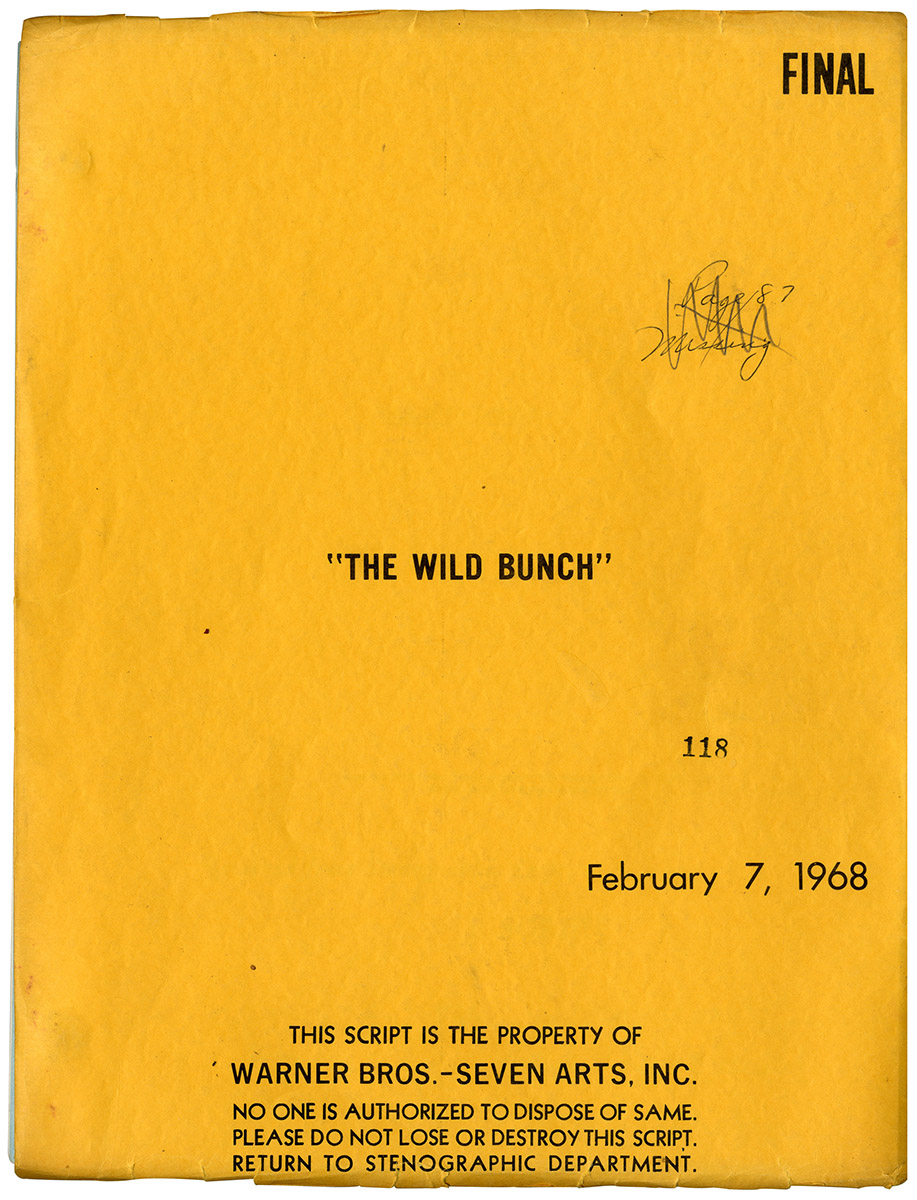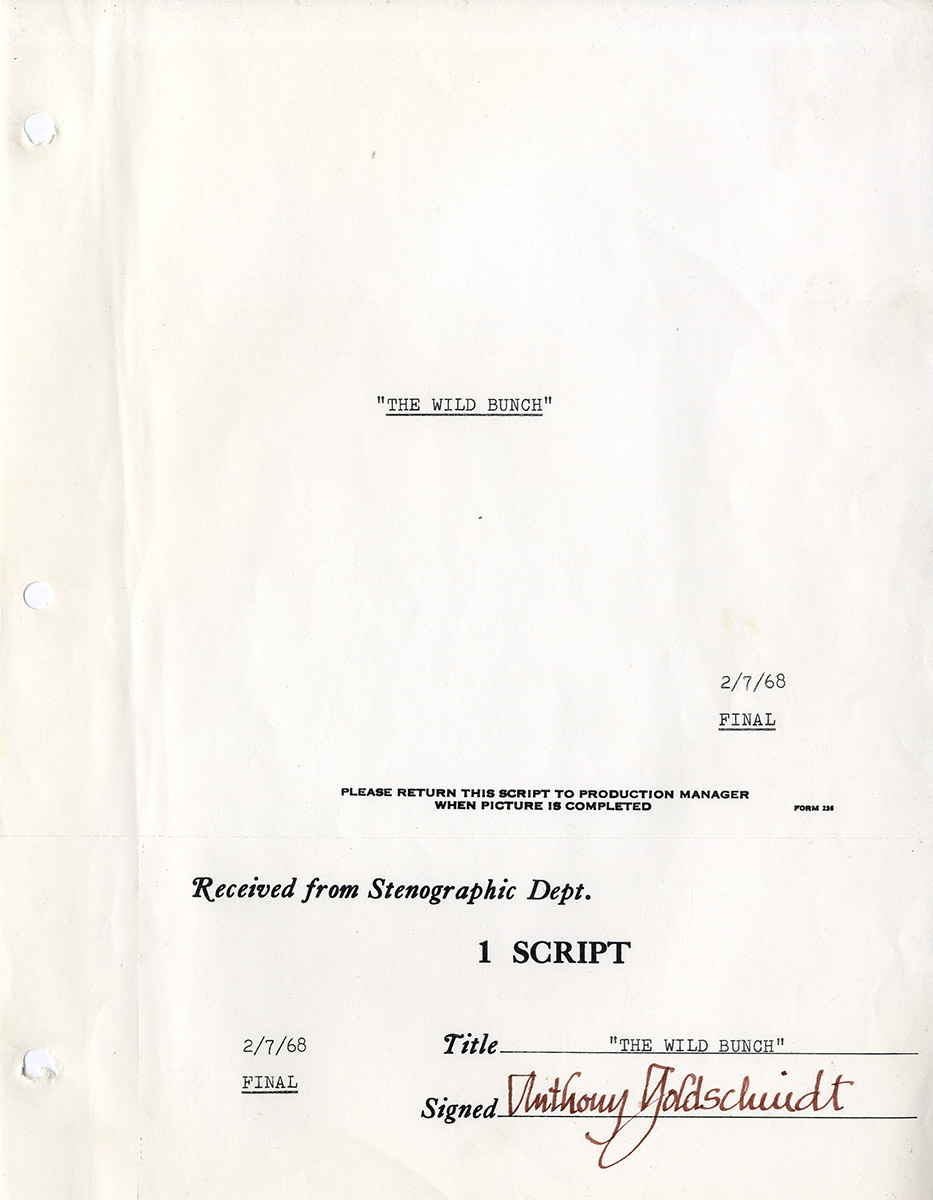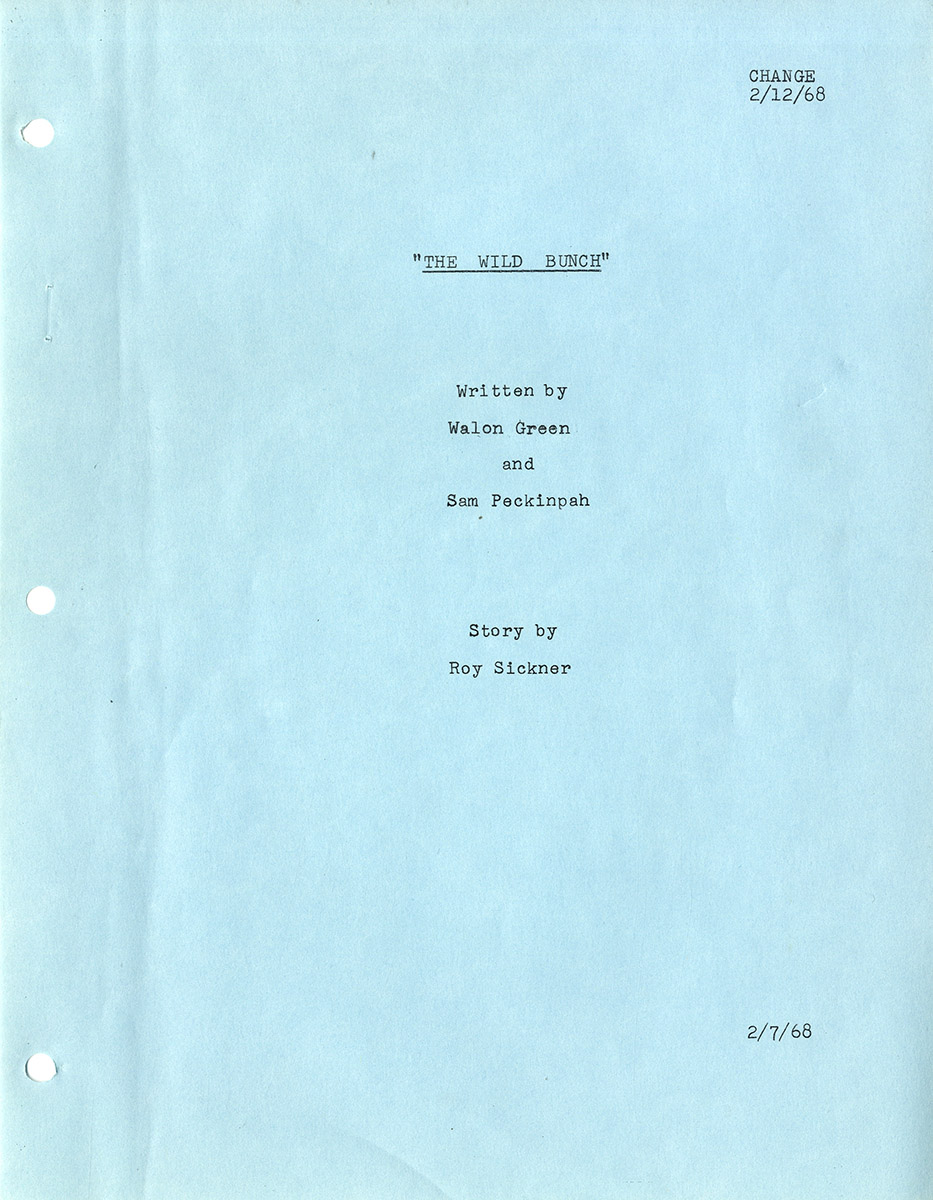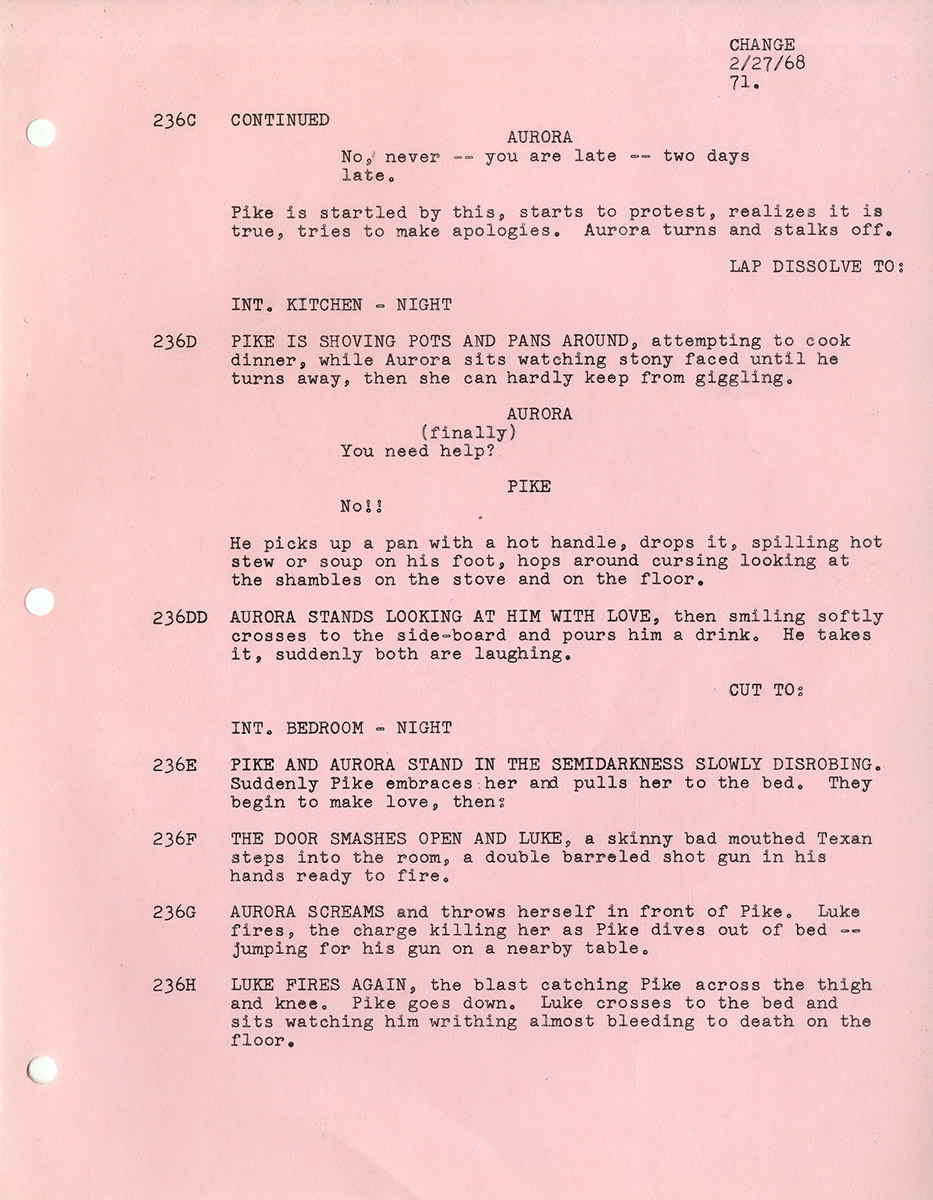Sam Peckinpah (director, co-screenwriter) THE WILD BUNCH (Feb 7, 1968) Revised final draft script
Burbank, CA: Warner Brothers, 1968. Vintage original film script, 11 x 8 1/2″ (28 x 22 cm.), printed wrappers, 133 leaves (printed on recto only), with last leaf of text numbered 128. Distribution page signed by Anthony Goldschmidt, assistant to producer Phil Feldman. Goldenrod titled wrappers, noted as “FINAL” on the front wrapper, rubber-stamped copy “No. 118”, dated February 7, 1968. Distribution page present with receipt intact. Blue revision title page present dated 2/12/68, with credits for screenwriters Green and Peckinpah and story writer Sickner. 133 leaves, with last leaf of text numbered 128. Mechanically reproduced, with blue and pink revision pages throughout dated variously between 2/12/68 and 2/27/68. Pages near fine, wrapper very good+, brad bound.
Director Sam Peckinpah’s and screenwriter Walon Green’s The Wild Bunch was inspired, however loosely, by a real-life outlaw gang that terrorized Arkansas, Kansas, Missouri, and Oklahoma Territory during the 1890s. Like Peckinpah’s aging outlaws, the real-life Wild Bunch sometimes robbed trains and train offices, but unlike Peckinpah’s gang, the real-life Wild Bunch never ventured South into Mexico or participated in the Mexican Revolution.
The Academy Award-nominated screenplay credited to Walon Green and Sam Peckinpah is remarkable for its symmetries and mirror reflections. It begins with a scene of mass violence and ends with a scene of mass violence. The gang of outlaws known as the Wild Bunch are mirrored by the bounty hunters who pursue them.
Specifically, the leader of the outlaw gang, Pike Bishop (William Holden), is mirrored in age and character by the leader of the bounty hunters, Deke Thornton (Robert Ryan), who was once rode with Bishop. The two most clownish members of the outlaw gang, Lyle and Tector Gorch (Warren Oates and Ben Johnson), are mirrored by their even more buffoonish bounty hunter counterparts, Coffer and T.C. (Strother Martin and L.Q. Jones). The corrupt Mexican Federales with whom the Wild Bunch do business, and their fascistic leader General Mapache (Emilio Fernández), are mirrored by the benevolent Mexican villagers who shelter the Wild Bunch, and their patriarch Don José (Chano Urueta).
The Green/Peckinpah screenplay is considerably more talky than the completed film. Whenever possible, Peckinpah would cut script dialogue explaining things that in the film were communicated wordlessly through the actors’ actions and performances.
Regardless, almost all of the film’s most quotable lines come directly from the screenplay. For example:
“If they move, kill them.“
“Well, how’d you like to kiss my sister’s black cat’s ass?“
“We all dream of being a child again — even the worst of us — perhaps the worst most of all.“
The principal differences between the screenplay and the completed film arise from Peckinpah’s working methods, his way of improvising action on location. Thus, in the opening sequence as written, we cut between three main groups — the Wild Bunch riding into a Western town to rob its railway office, the bounty hunters waiting to ambush the Wild Bunch, and a minister preaching temperance to his flock — but in the sequence as filmed, Peckinpah adds a fourth group, a circle of children cruelly torturing a scorpion on top of an ant hill (an image which for some people encapsulates the entire movie). The movie is filled with these improvised moments.
The Wild Bunch is remembered for its male camaraderie, its gritty realism, its violence, and its rapid-fire montage. There are, in fact, more cuts in The Wild Bunch than in any color film made up to that time. The screenplay ends with Deke Thornton and old-timer Sykes (Edmond O’Brien) deciding to join the Mexican revolutionaries. Says Sykes to Thornton, “It ain’t what it used to be, but it’s better than nothin’.” In the movie, that line is slightly changed, “It ain’t what it used to be, but it’ll do.”
Collation: NOTE pink pages (P), blue pages (B).
[dist] (2/17/68, notation), [title] (B, 2/12/68), 1-4, 5 (B, 2/12/68), 6 (P, 2/27/68), 7-15, 16-17 (P, 2/27/68), 18, 19 (B, 2/12/68), 20-21, 22 (B, 2/12/68), 23, 24 (B, 2/12/68), 25-26, 27 (B, 2/12/68), 28-31, 32 (P, 2/23/68), 33 (P, 2/27/68), 34 (B, 2/12/68), 35, 36-37 (B, 2/12/68), 38-40, 41 (B, 2/14/68), 42-45, 46 (B, 2/12/68), 47-49, 50 (B, 2/12/68), 51-52, 53 (P, 2/27/68), 54 (B, 2/12/68), 55-56, 57 (P, 2/27/68), 58-59, 60-61 (B, 2/12/68), 62, 63 (P, 2/27/68), 64, 65 (B, 2/12/68), 65A (B, 2/12/68), 66 (B, 2/12/68), 67 (P, 2/27/68), 68-69, 70-71 (P, 2/27/68), 71A-71B (P, 2/27/68), 72-76, 77-84 (P, 2/27/68), 85, 86 (P, 2/27/68), 87. 88 (B, 2/12/68),, 89-91, 92 (B, 2/12/68), 93-95, 96 (B, 2/12/68), 97, 98 (B, 2/12/68), 99-100, 101-104 (B, 2/12/68), 105, 106 (B, 2/12/68), 107, 108-113 (B, 2/12/68), 114, 115-116 (B, 2/12/68), 117, 118-121 (B, 2/12/68), 122, 123-127 (B, 2/12/68), 128.
Out of stock
Related products
-
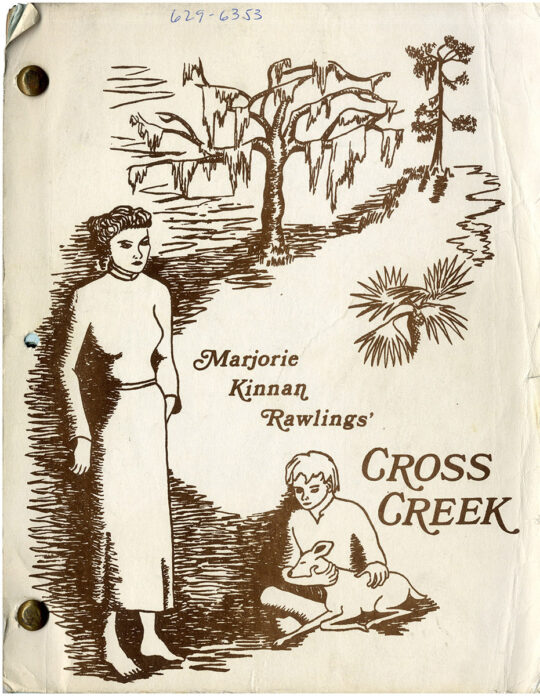
CROSS CREEK (Feb 9, 1982) Rev Final Shooting script by Dalene Young
$750.00 Add to cart -
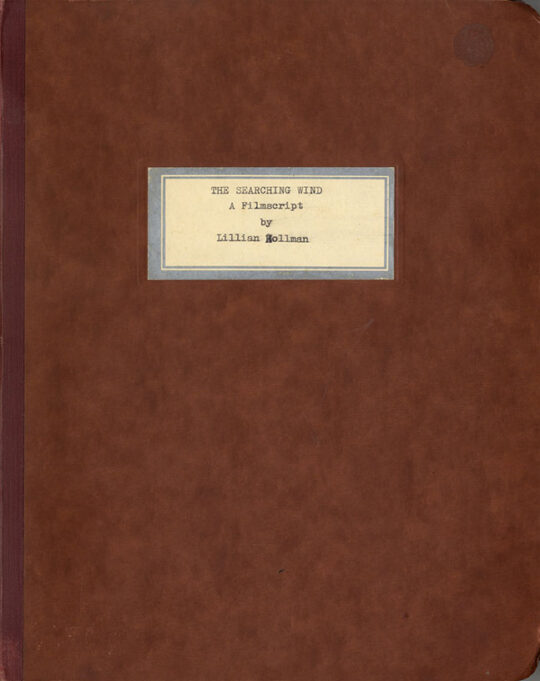
SEARCHING WIND, THE (Nov 7, 1946) Final White script by Lillian Hellman
$1,500.00 Add to cart -
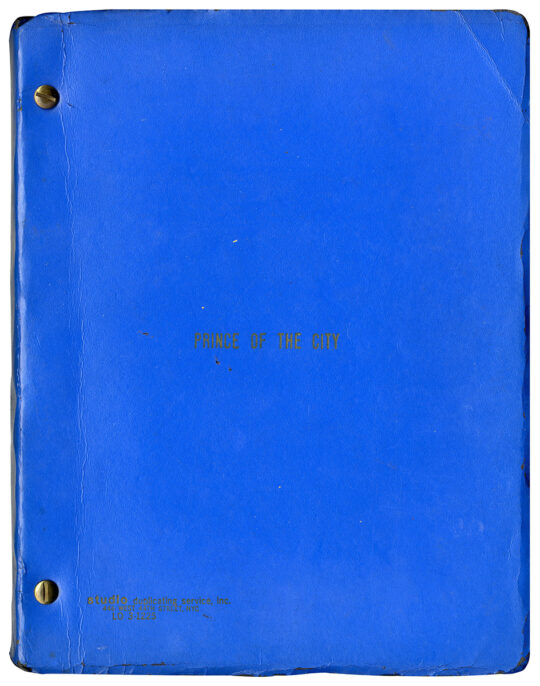
Sidney Lumet (director) PRINCE OF THE CITY (Jan 1980) Final Draft film script
$950.00 Add to cart -
![CHINATOWN [ca. 1973] Jack Nicholson's copy of early draft film script by Robert Towne](https://www.walterfilm.com/wp-content/uploads/2024/06/ChinatownSCR_a-540x693.jpg)
CHINATOWN [ca. 1973] Jack Nicholson’s copy of early draft film script by Robert Towne
$18,500.00 Add to cart

